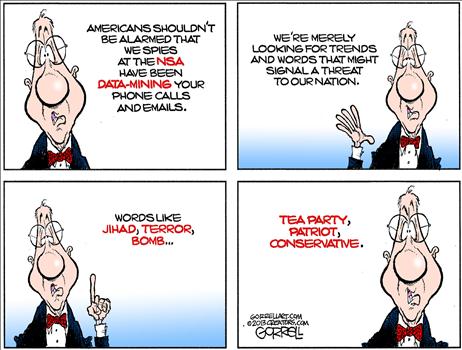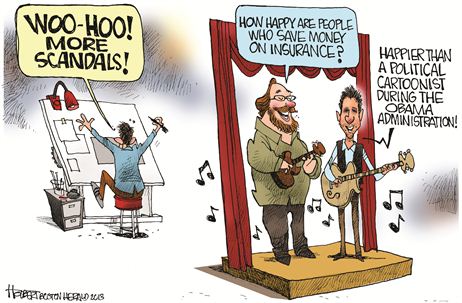 As of this past Sunday, we have a new household name: Edward Snowden. In these two-plus days of his notoriety, his actions have divided people, and not clearly along ideological lines. Some conservatives and liberals support what he has done; others deplore his decision. What has he done? Working with a company contracting with the National Security Agency (NSA), he leaked secret information about the “date-mining” the NSA is doing. Then he left everything and everyone behind, sneaked over to Hong Kong, and hid himself in a hotel room. Finally, he concluded it would be great to reveal himself as the leaker, using a Far-Left newspaper, the Guardian of the UK, as his conduit.
As of this past Sunday, we have a new household name: Edward Snowden. In these two-plus days of his notoriety, his actions have divided people, and not clearly along ideological lines. Some conservatives and liberals support what he has done; others deplore his decision. What has he done? Working with a company contracting with the National Security Agency (NSA), he leaked secret information about the “date-mining” the NSA is doing. Then he left everything and everyone behind, sneaked over to Hong Kong, and hid himself in a hotel room. Finally, he concluded it would be great to reveal himself as the leaker, using a Far-Left newspaper, the Guardian of the UK, as his conduit.
Is Snowden a traitor or a hero? That’s the question being asked in all the news reports. What do I think of his actions? I’ll get back to that shortly.
The issues are complicated for this burgeoning scandal. Of all the scandals that have surfaced over the past month—Benghazi, IRS, DOJ—this one has caused more division. Most people, even Democrat politicians, seem to grasp the damage done by those other scandals, but there is no consensus on this one. Here are some solid principles to start our thinking:
- One of the primary purposes of the American government, as outlined in the Constitution, is to protect its citizens. Under the Bush administration, the Patriot Act was signed into law to open up the channels of communication between national security agencies such as the NSA, the FBI, and the CIA. Bush realized, legitimately, that the lack of openness created by laws that set up barriers, helped create a climate of ignorance that led to the attacks on 9/11.
- In our attempts to discover threats to national security, it is necessary to gather as much intelligence as we can to avoid another terrorist attack on American soil.
- As we do this, we cannot throw constitutional guarantees under the bus. We must not abridge the First Amendment right to free political speech and free exercise of religion; we must resist all efforts to disarm a populace that may need those arms for personal protection; we should never allow government snooping that disregards the Fourth Amendment’s assurance against general search warrants. One of the opening salvos in the colonists’ resistance to Great Britain in our early days was the tyranny of general search warrants, whereby the government could come into one’s home and look for whatever, without a specific court order for a specific item. It amounted to the total loss of one’s security in one’s home.
The NSA program’s objective in its search for phone records, e-mails, etc., is to find the links that could lead to terror. I understand that. It is essential to stop those plans to save lives. Yet, what Snowden is saying is that the search has become so all-inclusive that we have potentially lost all rights to privacy—that the government can know about everyone we’ve called and can read all our e-mails. Yes, that is a scary scenario. Why? First, because of the violation that would be of the Fourth Amendment [and the First, if prosecution should follow]. Second, because we’ve already seen how this particular administration has no regard whatsoever for constitutional guarantees.
Those other ongoing scandals have revealed a desire by this government to curtail freedom of speech and religion, and to pursue reporters who even dare to ask significant questions about administration policy. You’ll have to forgive me if Obama’s assurances leave me cold:
So, while there are legitimate reasons to data-mine, to some extent, the rub is the extensive nature of the mining. When you throw a net over all phone calls, that’s potentially the same as a general search warrant. If the government really can read all our e-mails—still a disputable point, at least considering the magnitude of the task—that is a clear and present danger to freedom of political speech, especially in an atmosphere that relishes the targeting of perceived political “enemies.”
That brings us back to Snowden. Is he a hero or a traitor? For those who take the first view, he has bravely put his life on the line to reveal the extent of the program. Life for him will no longer be the same. He has uncovered a threat to American liberty. I understand that, and certainly have sympathies in that direction.
For those who take the second view, he has endangered national security, fled his responsibilities, decided to reside in an area ruled by Communist China, which is already doing its best to undermine our cyber-security, and should be brought to justice. Some have openly declared him a defector and traitor whose actions have put lives at risk; therefore, he should receive the death penalty for what he has done.
My position, at this point, and until I can digest more information, is that this data-mining does require the greatest of scrutiny. There are intelligence committees in both houses of Congress that already are overseeing the program. I would like to know if they have been doing their job adequately. Have they permitted this to get out of hand? The original intent of the Patriot Act was not to gather this kind of intrusive information from all American citizens. The FISA court, which allows the searching, is supposed to guarantee that the focus of the searches is on foreign individuals, not Americans. Is the court doing its job?
For those reasons, I am glad for the exposure. We need to be aware of what our government is doing, and if it has crossed the line. That’s not a paranoid delusion, given this administration’s track record and its overall ideology.
However, I do not support the manner in which the exposure occurred. As I read about Snowden and listen to him, I don’t come away convinced he is this paragon of virtue that many have claimed. It’s too soon to erect a statue in his honor. He went outside the channels whereby he could have raised the issues. Other whistleblowers have taken their evidence directly to Congress. I saw an interview the other day with one former government employee who followed those channels and accomplished his goals. He was just as outraged by the exposure of the data-mining as Snowden, yet he condemned Snowden’s actions.
Frankly—and I know many will disagree—I sense that Snowden is on the immature side, with a flair for the grandiose. His method of exposure is exactly what I would expect from someone seeking the limelight. It’s a rash action, with little thought to the consequences, his supposed cautions notwithstanding. I have little confidence in his character.
Therefore, let the scrutiny proceed; it’s necessary to ensure our liberties. But let’s not set up a pedestal and place Edward Snowden’s likeness on it.
The one real beneficiary of all these scandals?



